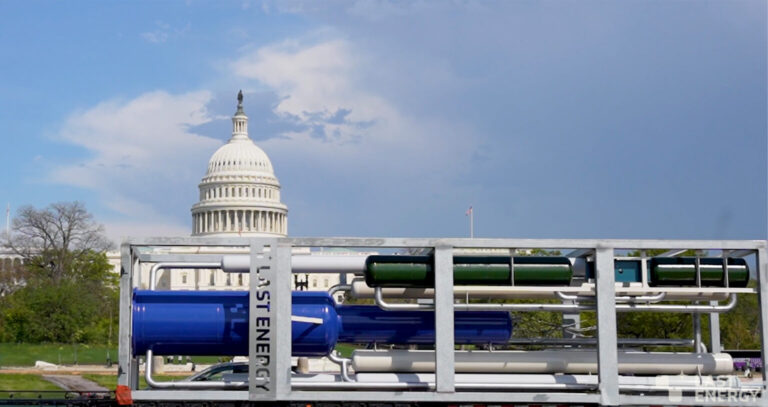By: Shannon Heckt – Louisiana Illuminator
The Louisiana Legislature is working to speed up the permitting process to allow small nuclear reactors to be added to the state’s portfolio of energy production. Although the technology is not yet in use in the United States, proponents see it as a low-emissions option to provide electricity in areas that struggle to get reliable power.
Energy analysts say there are reasons why what are known as small modular reactors (SMRs) have not caught on yet in America – chief among them is the cost.
Senate Bill 127, by Sen. Adam Bass, R-Bossier City, would allow the Louisiana Department of Environmental Quality to create an expedited environmental permitting process for building small modular reactors. That would position the state to be ready when the federal Nuclear Regulatory Commission allows the projects to move forward. The bill advanced out of the Senate Committee on Environmental Quality and heads next to the full Senate.
“You have companies in states like Texas that are starting that process,” LDEQ Secretary Aurelia Skipwith Giacometto said Tuesday at the State Capitol after the Senate committee hearing on Bass’ bill.
Supporters of the proposal hope SMRs can be used by not only utilities but also industrial facilities that need an exclusive, on-site power source. Gov. Jeff Landry has included nuclear energy as part of an “all of the above” approach he supports to meet the state’s power needs.
Sizing up SMRs
According to the U.S. Department of Energy, small modular reactors range from one-tenth to one-fourth the size of a standard nuclear reactor. They can produce between 10-300 megawatts of power. That’s compared to an estimated 2,142 megawatts Entergy reports its two nuclear plants in Louisiana generate combined.
The cost to build small nuclear reactors is steep. A study last year from the Institute for Energy Economics and Financial Analysis found the cost to construct an SMR averaged $25,000 per kilowatt generated as of 2023 – more than double the rate in 2015.
For a 10-megawatt reactor – the power level for the smallest SMR – the total cost comes to about $250 million.
Edwin Lyman, director of nuclear power safety for the Union of Concerned Scientists, said that in order for utilities to buy into small nuclear reactors, it will take government subsidies and tax credits to make the cost worthwhile.
“If you’re trying to make them smaller, they’re gonna be less economic unless you come up with some way to compensate for this penalty for making them smaller,” Lyman told the Illuminator in a phone interview. “… There’s no one in the world that’s ordering SMRs in the amounts that would be needed to start to see the benefit of central manufacturing.”
Lyman noted there are two current applications to the Nuclear Regulatory Commission for new nuclear reactors in the U.S, and both “are half-funded by the federal government and the other half funded by rich people like Bill Gates.”
“So there’s actually a lot less going on that meets the eye, and again, the bottom line is cost …” he said. “Utilities and users know how expensive these things are.”
After a strong of nuclear power plant shutdowns in recent decades, there has been a push to bring them back online to address increasing energy needs. This momentum has carried over to introduce SMRs in the United States.
LSU mechanical engineering professor Manas Gartias said there is industry interest in placing SMRs near petrochemical plants to reduce their carbon footprint by using nuclear power to run the plants and offset some of their emissions. Although nuclear plants do not produce carbon dioxide, their critics note their environmental impact in the form of uranium mining and waste storage.
Gartias also said that if SMR models become standardized, it will bring down the price and time to build them.
Waste and billing questions
The Alliance for Affordable Energy, a Louisiana-based consumer advocacy group, is not taking a stance on the Bass bill but wants more answers on who will pay for small modular reactor projects – and whether those costs will be passed down to ratepayers.
“We stopped building nuclear for a long time, but now there are really vague and not very recent examples of us building nuclear on time and on budget,” Jackson Voss, the alliance’s climate policy coordinator, told the Illuminator.
When asked by committee member Sen. Patrick Connick, R-Marrero, what would happen to the waste created by small modular reactors, Bass did not give a clear answer. He said some companies use the waste to generate more power. Connick said he wants more information about the waste before the next vote on the bill on the Senate floor, which has not been scheduled yet.
There are no current proposals to place SMRs in Louisiana. A few projects in other states are under licensing review with the Nuclear Regulatory Commission, and the first are projected to be built within the next 10 years.
Louisiana recently joined several states in suing the federal government to loosen its regulations around nuclear power. The lawsuit claims blanket rules are not equal for reactors that vary in size. SMRs are safer and create less nuclear waste, so they should have different regulations from the full-sized reactors, the plaintiff states argue.
“Ultimately, if you’re looking at what we are doing on the legislative side, see what we are doing when it comes to litigation, that puts in companies’ eyes that Louisiana is a desirable state” for nuclear power, Giacometto said.
Giacometto said the governor is onboard with the lawsuit.

